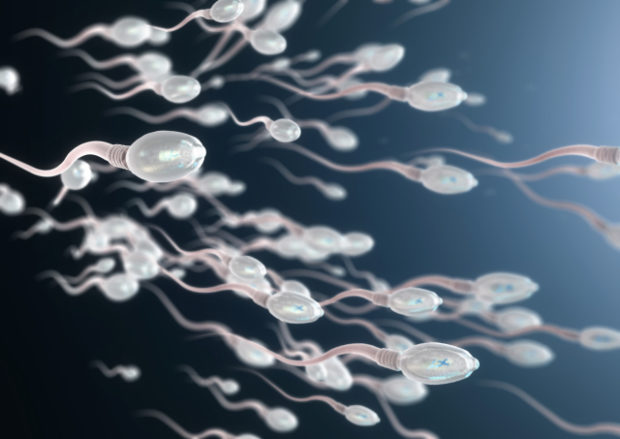
Image: Istock.com/man_at_mouse via AFP Relaxnews
In the midst of the many global problems we face today, one of humanity’s biggest problems goes relatively unnoticed: the decline in reproductive health, especially for men.
Specifically, the male sperm count in the West declined significantly by 59% between 1973 and 2011 due to chemicals found in items of daily use, a study co-authored by Dr. Shanna Swan in 2017 found.
In the study, which made headlines around the world, scientists noted that sperm count is of considerable importance for public health for several reasons, including declining male fertility and increasing other health problems, such as cancer. testicular.
“If you look at the sperm count curve and project it forward – which is always risky – it reaches zero in 2045,” said Swan in his new book entitled “Countdown: how our modern world is threatening the sperm count, changing the male gender and female reproductive development and threatening the future of the human race ”, as quoted by Axios on 24 February.
In the book, Swan also noted that, in addition to the decline in sperm count, penis size and testicle volume have declined among humans in recent decades.
“The current state of reproductive affairs cannot continue much longer without threatening human survival,” writes Swan in the book.
Swan has since doubled down on his notice via American scientific on March 16, where she co-wrote with Stacey Colino that the decline in reproductive health is happening to women as well.
They found that reproductive problems in men have increased by 1% a year, while the rate of abortion in women in the United States is also increasing by 1% a year.
Swan and Colino noted that while 1% may not seem like a large number to the public, it actually is, because that means an increase of 10% every decade and an increase of 50% in just 50 years.
This increase in reproductive health problems is faster than global warming, but the public has not been so eloquent or informed about the issue, that it threatens the existence of humanity.
Hormone-altering chemicals
This decline in reproductive health is largely due to chemicals that alter the hormones found in items found around us: from plastic containers, food packaging, water bottles to electronic devices, pesticides and many others.
These items contain chemicals such as phthalates, bisphenol A and flame retardants, among others. It is no accident that the decline in reproductive health began in the mid-20th century, when these items began to be produced in large numbers, the researchers noted.
“Exposure to these chemicals is especially problematic during pregnancy because what happens during pregnancy does not remain in pregnancy. Instead, a future mother’s exposure to toxic chemicals in the air she breathes, the water she drinks, the food she eats and the products she passes on her skin can enter her body (and therefore the fetus) and influence your baby’s reproductive development, ”Swan and Colino explained.
“This is particularly true in early pregnancy – in the so-called reproductive programming window – and is especially true for male babies,” they added.
Among the many health problems, the effect of these chemicals on reproductive health has also been linked to premature death.
Researchers are asking humanity to “change our collective focus” and prioritize the requirement to replace these chemicals in our daily items with chemicals that do not affect our hormones.
“It is also time to establish better testing methods and regulatory actions so that only safe chemicals can enter the market and in our bodies. In other words, we need to stop using each other and our unborn children as laboratory mice for exposures to EDC ”, emphasized Swan and Colino.
“The health and future of the human race really depends on it,” they added. Ian Biong /frog
RELATED STORIES:
Men who smoke before conceiving their children can affect the semen quality of adult children
Being overweight or obese may decrease sperm quality in men, according to study
Read on
Sign up for INQUIRER PLUS to get access to The Philippine Daily Inquirer and over 70 other titles, share up to 5 gadgets, listen to news, download at 4 am and share articles on social media. Call 896 6000.
For feedback, complaints or questions, please contact us.


